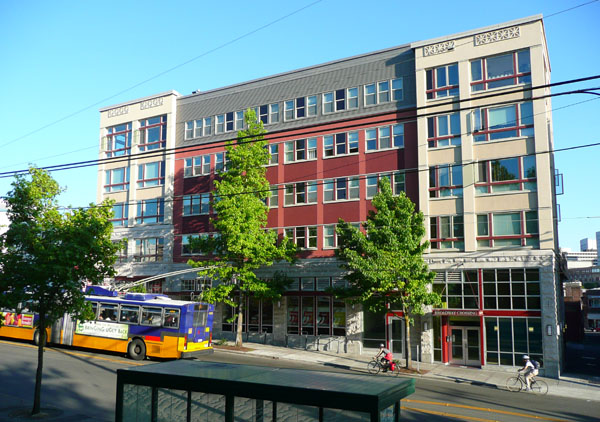The Only Problem With The Proposed Seattle Housing Levy Is That It Isn’t Big Enough

On June 15 Seattle City Council approved the Mayor’s $145 million Housing Levy proposal, which will now be subject to voter approval this November. The current levy (3 mb pdf) has been a popular and successful program, and has been a key tool for enabling affordable housing projects all over the city (6 mb pdf).
Broadway Crossing on Capitol Hill—shown above—is a prime example of the kind of affordable project that addresses the housing needs of the City. Replacing a gas station, it brings affordable housing to a area that has been rapidly gentrifying, and also happens to be Seattle’s most pedestrian-oriented neighborhood.  The building is LEED Silver certified, demonstrating that with smart design, even affordable projects on tight budgets can be green.
But in all likelihood, Broadway Crossing would not have been feasible without levy funds, and instead the neighborhood would have got a single-story Walgreen’s store surrounded by surface parking. And even though levy funds typically make a relatively small portion of the project’s total budget—on the order of 10 to 15 percent—the levy is key for establishing the legitimacy of a planned project, which then helps secure other sources of funding. The City of Seattle estimates that every levy dollar spent leverages $3.25 of other public or private funding.
The proposed levy would assess $17 on every $100,000 of property value, up from the current levy’s $15. The owner of a $400,000 home would pay $68 per year, or $5.67 a month—barely enough for two lattes, without tip.  (It says a lot about Jan Drago that she felt the need to posture about reducing the levy before voting for it anyway.)
Meanwhile, in the post-housing bubble economy, funding sources for affordable housing are shrinking, even as the need for that housing grows.  With corporate profits down, the value of tax credits have dropped precipitously. And Washington State recently cut the Housing Trust Fund in half, from $200 to $100 million.
It is widely recognized that affordable housing is an essential ingredient of balanced, diverse, and sustainable cities. Lack of affordable housing not only frays the social fabric of local communities, but also compromises regional sustainability via the “drive ’til you qualify†effect, which exacerbates sprawl and long commutes. Historically, the demand for housing levy funds has outstripped supply.  So then, would it really be too much if we were to, say for example, double the proposed levy rate and ask the average Seattle homeowner to donate about a latte a week to help promote long-term local and regional sustainability?
But so be it, the levy we will vote on is set. Hopefully the fact that the housing levy is modest relative to its importance will lead to strong voter approval come November, as has been the case with the City’s previous housing levies.
The Yes for Homes levy campaign kickoff event is next Wednesday July 15, 5 – 7pm, at the Swedish Cultural Center, 1920 Dexter Avenue North.
